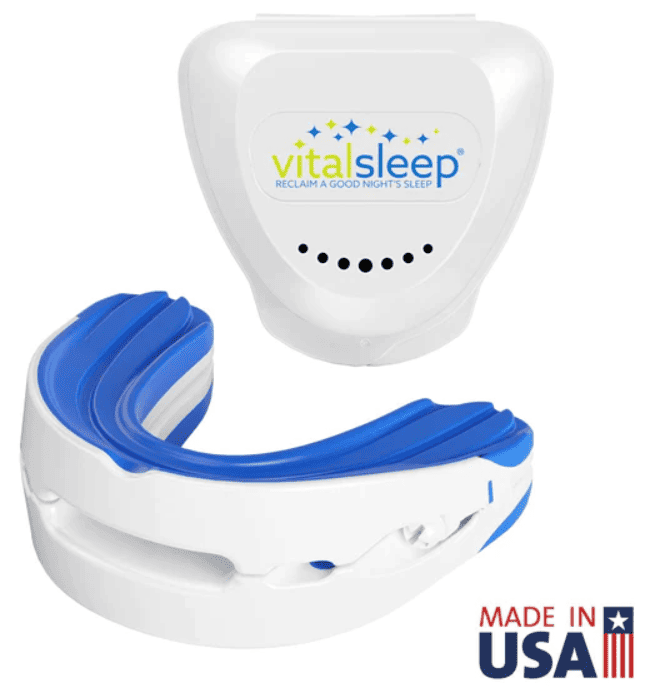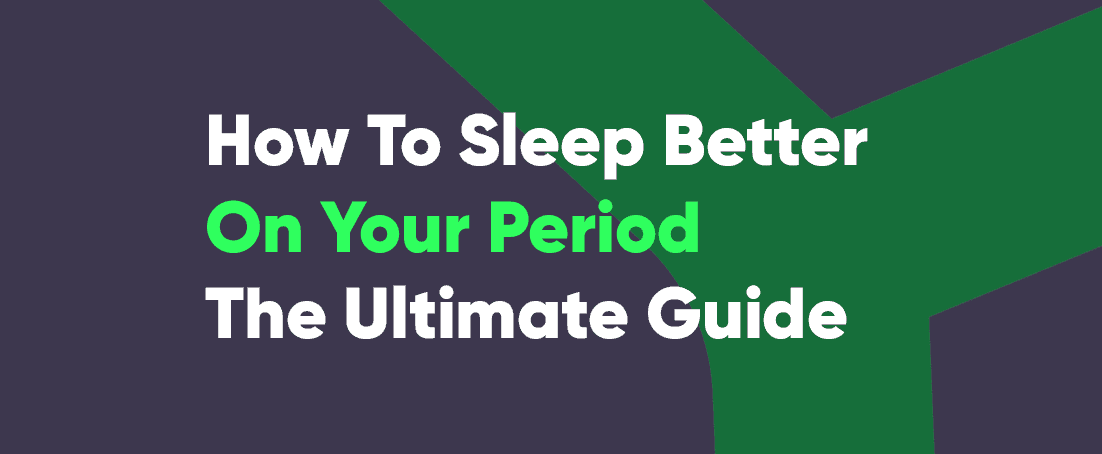Every woman knows the monthly struggle that unsettles their sleep routine, leaving them craving for quality sleep during their period. As if the cramps, mood swings, and fear of leakage weren’t enough, the inability to rest peacefully sends them down the spiral. Issues related to menstruation have a significant effect on sleep. A PubMed study links menstrual cramps with decreased sleep quality and sleep efficiency.
In this guide, we will walk you through the common issues women face during periods and ways to relieve them. The article is packed with research-backed advice on improving your sleep quality and reclaiming your nighttime rest even while on your period.
Key Takeaways
- Hormonal fluctuations during the menstrual cycle significantly affect sleep quality, with progesterone and estrogen levels playing a crucial role.
- Optimal sleep during menstruation can be achieved through proper sleep hygiene, including choosing comfortable sleepwear and maintaining a cool room temperature.
- Lifestyle adjustments, such as diet modifications, hydration, and engaging in light exercise, can enhance sleep quality during periods.
- Establishing a pre-bedtime routine that includes relaxation techniques and avoiding screens can help facilitate better sleep.
- For persistent sleep disturbances during menstruation, consulting a healthcare provider is advisable, and using an anti-snoring mouthpiece may be recommended to improve sleep quality.
Table of Contents:
- Hormones and Z's – Why Periods Disrupt Sleep
- Best Sleeping Position To Sleep Better On Your Period
- Choosing the Right Sleepwear For Regular Sleep During Your Period
- Lifestyle Tweaks for Quality Z's During Your Period
- Sweat it Out Before You Snooze
- Establishing Pre-Bedtime Routines
- When More Sleep Isn't Enough – Seeking Professional Advice
Hormones and Z’s – Why Periods Disrupt Sleep
The entire menstrual cycle is an orchestra of hormones, the fluctuations of which significantly affect your sleep. The two most important hormones in this effect are progesterone and estrogen. The elevated estrogen during the ovulation phase can help you sleep better. But when the mid-luteal phase comes, progesterone levels peak, resulting in a worsening of sleep quality.
According to research, women often report affected sleep quality during the premenstrual week compared to other times of the menstrual cycle. It is important to note here that progesterone otherwise has sleep-promoting effects, but a drop in its levels during the late luteal phase can lead to sleep disturbance. Enter hormonal birth control pills, which keep the body in the same phase as it is in the period, acting as a conductor in this orchestra of hormones.
While you can’t do much about natural hormone fluctuation, you can take charge of your body by developing good sleep hygiene, regular workouts, and creating a peaceful environment to sleep, which can greatly improve your sleep quality during your period.
Best Sleeping Position To Sleep Better On Your Period
One of the best ways to find comfort during your period is to find the right sleeping position. Learn about suitable sleeping positions to enhance comfort during periods. Curling up by bending your arms and legs and lying sideways, also known as fetal position, is recommended by experts to reduce cramps. The position removes pressure from the abdominal muscles, helping you feel relaxed. Besides alleviating discomfort, the position helps you breathe easily, giving you a more rejuvenating sleep experience.
You can also sleep on your back or side when you are having a period, as these positions reduce abdominal pressure. However, sleeping on your stomach isn’t recommended due to the risk of overnight leaks and squeezing your uterus.
Positioning a pillow between your thighs as you sleep on your side or beneath your knees while sleeping on your back can immensely help with the cramps. In the later sections, we will guide you about good sleep hygiene and some pre-sleep prep that can additionally help you enhance your sleep quality during your period.
Sideways to Slumberland – How to Sleep with Period Cramps
Along with some pre-sleep prep, simply changing your position works wonders. Sleeping in the wrong positions will aggravate your worries by causing neck, back, or joint pain. As the stomach acid flows back into the esophagus with the wrong sleeping positions, it can also contribute to indigestion and acid reflux.
For some much-needed slumber comfort, curl up like a fetus, as if you are hugging yourself. It relieves period cramps, making you comfortable enough to sleep peacefully without disruption. Keeping a small pillow between your thighs also helps with the cramps.
Back to Basics – Sleeping Positions to Relieve Menstrual Cramps
Lying on your back can provide several benefits during your period, such as less abdominal pressure, prevention of leakage, and improved breathing. The position allows even distribution of body weight, reducing pressure on an aching abdomen. It also aligns your spine properly, helping with back pain associated with menstruation.
When you are lying on your back, menstrual products such as pads and tampons are positioned correctly. It prevents leakage, providing you peace of mind during the night. Above all, the position keeps your airways open, allowing you to breathe comfortably. This is especially helpful for expecting women who experience snoring issues. Here you can get more tips on how to stop snoring during pregnancy.
For added support, slide a pillow beneath your knees as you sleep on your back.
Choosing the Right Sleepwear For Regular Sleep During Your Period
Optimal comfort is important, especially when you are trying to sleep on your period. The right sleepwear makes all the difference for a good night’s sleep. Choosing fabrics like cotton, silk, linen, and bamboo lets your skin breathe, allowing your body to regulate its temperature. Loose, comfortable pajamas give you a higher range of motion without restriction.
Good quality menstrual products and mouthpieces to avoid snoring work like a charm for worry-free nights during your period. Choose products like pads, tampons, or menstrual cups that suit you best. Sanitary napkins or pads are commonly used, but choose ones made with eco-friendly material and good absorbency.
When it comes to eco-friendly options, a menstrual cup is the best. You can wear them comfortably for long without the risk of leakage, allowing for better sleep quality.
If you suffer from sleep disordered breathing and face the issue of snoring during your period, using a mouthpiece can help. A good quality mouthpiece repositions your jaw and keeps the tongue in place, reducing Obstructive Sleep Apnea and snoring. Choose a suitable mouthpiece so you can rest peacefully and rise up in the morning feeling refreshed.

Perfectly customizable boil-and-bite mouthpiece ┃ Made of high quality material ┃ 30-day money-back guarantee ┃ 1-year warranty ┃Effectively reduces snoring
100% MONEY-BACK GUARANTEE
Visit Vital SleepPad Perfection – How to Sleep on Your Period with a Pad
Sleep quality during menstruation highly depends on the type of menstrual products you use. Poor-quality sanitary napkins have low-grade adhesives and inadequate absorption, leading to leakages at night. They also cause rashes and foul odors.
Choose pads with extensive coverage and high absorbency depending on your specific needs to provide better protection against leaks. The material of the pads should be gentle on your skin, and they should have odor control features to keep you refreshed and comfortable. Pads with a wider back minimize the risk of leakage. Another feature to look for is the presence of adhesive strips to keep the pad securely in place without the fear of staining.
For environmental concerns, you can opt for eco-friendly reusable pads. Not only they are sustainable, but they do not let you compromise on protection and comfort.
Tip: Always change your pad before sleeping for higher comfort and peace of mind.
Lifestyle Tweaks for Quality Z’s During Your Period
There are several lifestyle changes that you can adopt to enhance sleep quality during your period. A peaceful night’s sleep is no more imperceptible if you take care of the following.
1. Cool Room Temperature: Keeping your room temperature on the cooler side promotes better sleep quality. It helps with a regulated body temperature, which in turn keeps you comfortable under the covers during the period.
2. Watch Your Diet: It’s important to pay attention to what you eat. There are things you must avoid at all costs, such as heavy, spicy, and greasy foods. Instead, eat light, easily digestible meals to avoid bloating and indigestion.
3. Hydration Balance: Strike a balance when it comes to staying hydrated, while having a period. While proper hydration helps with a dry nasal passage and allows a good night’s sleep, overdoing so will end up in frequent bathroom trips, disrupting your sleep anyway when you are having a period.
4. Relaxation Techniques: To feel relaxed during bedtime, try relaxation techniques such as deep breathing, stretching, and a warm bath. These techniques can help you ease tension, reduce period-related pain, and prepare your body for proper sleep.
5. Limit Screen Time: Research from Harvard Medical School finds that the blue light from screens shifts circadian rhythm and suppresses melatonin, affecting sleep quality. The blue light hinders a normal sleep cycle, so avoid it completely before bedtime.
6. Gentle Exercise: Light physical activity relieves cramps and aids in improving sleep quality. You can go for a short walk or do some stretching exercises before going to bed.
7. Mindful Mindset: A positive mindset significantly reduces stress and anxiety during your period. As a result of staying calm, your menstrual symptoms ease and the sleep quality improves. You can try mindful meditation or listen to soothing music to clear your mind.
Adjust Your Sleep Environment
The need for a perfect sleep environment cannot be understated, especially when you are facing sleep issues during your period. Sleeping in a hot room makes you sweaty and uncomfortable, exacerbating sleep issues.
If your room is cool, your body temperature is well-regulated, and you can rest comfortably. You can use a fan to circulate cool air in the room if you are feeling hot. Another convenience a cooler room provides is that it helps one battle snoring effectively. For added support, here are my list of the best anti-snoring mouthpieces to ensure restful nights during your period. These devices work in tandem with a cool room to keep your breathing pathway open and reduce snoring.
Evening Eats for Easy Sleep
Another factor on which the quality of your sleep depends is what you eat in the evening. Smaller, healthier meals are more likely to help you sleep better. They also reduce inflammation in the body to reduce menstrual cramps, and are overall good for your health. On the contrary, heavy meals such as the midnight pizza you often crave, cakes, chips, or cookies cause bloating and indigestion. Here are some examples of what you can eat to ensure a good night’s sleep:
1. Lean Protein: When you are having a period, add a piece of lean meat, such as grilled chicken or fish, to your plate in the evening meal. Protein helps you feel fuller without overloading your digestive system.
2. Veggies: Fiber-rich vegetables, such as broccoli or spinach cooked in different forms, are recommended for better nutrition and easy digestion.
3. Whole Grains: Whole grains like brown rice or quinoa are an excellent source of complex carbs. They gradually release energy in the body, ensuring better sleep and digestion.
4. Light Dairy: Switch full-fat dairy with low-fat options such as yogurt or almond milk. Low-fat dairy doesn’t cause bloating and is easily digested to help you sleep without discomfort.
Making healthier choices for your evening meal sets the stage for a peaceful night’s sleep. These dietary adjustments and the recommended pre-sleep practices will help you sleep comfortably for long hours. The best part? All of the recommended alternatives still rank high on taste, so there is nothing to lose in that regard as well.
Sweat it Out Before You Snooze
Refraining from exercise during your period is a myth. While you should be careful about the intensity of your workout amid the period, regular exercise actually helps with a night of quality sleep. Explore why light exercises are an effective way to ease discomfort during your period:
- Exercise helps reduce stress and anxiety, both of which worsen sleep issues during your period. Light exercises would release endorphins, which help improve your mood and relax your mind so that you can sleep well for longer durations.
- A low-intensity workout can help alleviate menstrual pain and muscle tension associated with the menstrual cycle.
- According to research from NIH, higher levels of physical activity have been shown to improve sleep quality. It is due to the fact that regular exercise and yoga regulate your circadian rhythm and assist in deeper, restorative sleep.
- Exercise is known to help with hormone balance. As a result, your menstrual cycle is regulated, and your sleep is not impacted amid the period.
Whether it is a relaxing yoga routine or a session of light exercises, it will help you sleep better on your period. You will enjoy the feeling of waking up refreshed, ready to take on the responsibilities the new day brings.
Establishing Pre-Bedtime Routines
While we have discussed some of the tips that must be included in a pre-bedtime routine, here is a roundup to reinforce all of them, plus some more tips to keep sleeping issues at bay during periods:
1. Soothing Music: Who knew that listening to relaxing tunes on your favorite streaming app can be more than a satisfying hobby? While you are on your period, listening to a playlist of soothing music calms your mind and eases stress.
2. Dim the Lights: Lowering the lights in your room signals your body that it’s time to sleep, as it mimics daylight to darkness transition.
3. No Screens: An hour before you hit the bed, avoid using screens. Don’t let the blue light from screens disrupt a peaceful night of sleep. Avoid screens at least an hour before bedtime.
4. Gentle Stretching or Yoga: As discussed in detail, gentle exercises or yoga can be immensely helpful in relaxing your body, setting the perfect stage for a restful sleep.
Establishing a consistent pre-sleep routine, especially during your periods, helps you drift off to sleep more easily. Your body recognizes the signals as you keep following the regular sleep routine each night, and you will notice a significantly improved sleep quality.
When More Sleep Isn’t Enough – Seeking Professional Advice
All self help measures regarding how to sleep on your period advised in this article are backed by research. They can be helpful in many different ways, such as relaxing muscles while you are sleeping, reducing period pain, and improving period symptoms in general. However, it’s time to consult a healthcare provider if you notice a persistent sleep disturbance even after making all the efforts. Continued sleep problems during the period might point towards an underlying issue that should be addressed professionally.
Sleep problems during period like snoring interrupt your sleep and may remain a concern even after you try sleeping in a certain position. To curb this, a healthcare provider will suggest using a mouthpiece to resolve the issue. The anti-snoring mouthpiece effectiveness is well documented. Therefore, using a good quality one ensures the pesky sleep issue is properly addressed, and you can get a good night sleep.

